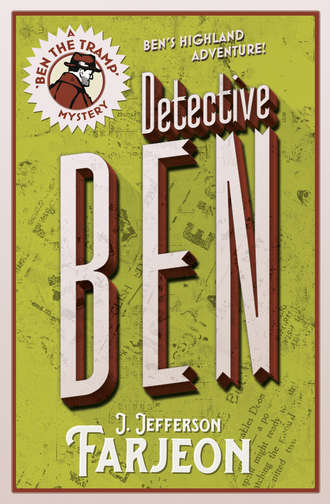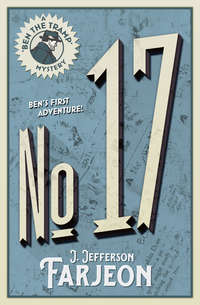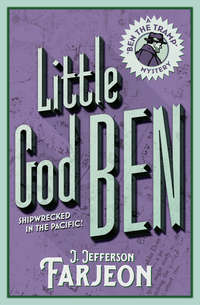
Полная версия
Detective Ben
‘P’r’aps yer could do with a bit,’ suggested Ben.
‘Perhaps I could, and perhaps I could not,’ replied Mr Sutcliffe thoughtfully. ‘And perhaps, after all, it would be a mistake to discuss it. Discussion is rather fatiguing, though, of course, one can always train. Well, now I have seen you and know what is on the other side of the wall, I shall return to my room. Good-night.’
‘’Ere, ’arf a mo’!’ exclaimed Ben, quickly. ‘If you’ve done, I’ve got a few things I’d like to ask!’
‘Be sure they are few,’ said Mr Sutcliffe, ‘and don’t count on getting answers.’
‘Well—corse, I knows a lot,’ began Ben, cautiously feeling his way. ‘I knows I’ve bin engaged fer a job—’
‘But you don’t know what the job is,’ interposed Mr Sutcliffe, helpfully. ‘No. And you won’t, till she chooses to tell you.’
‘Meanin’ you won’t!’
‘I certainly won’t.’
‘P’r’aps yer can’t?’
‘Perhaps I can’t. Perhaps is such a useful word. It means nothing.’
‘Oh, well—I can wait!’
‘Since you will have to, that is fortunate. I have no doubt, Mr Lynch, that in your own slum, or castle, or service flat, or Soho restaurant, you are the monarch of all you survey—but there is only one monarch here!’
‘Meanin’ Miss Warren?’
‘Meaning Miss Warren.’
‘Well, I’m ’ere to do ’er instrucshuns,’ said Ben, ‘but she can’t twist ’Arry Lynch rahnd ’er little finger!’
‘She can twist Stanley Sutcliffe round her little toe,’ confessed that individual.
‘Then why ain’t you doin’ ’er job?’
Mr Sutcliffe seemed intrigued by the question. He considered it as though this were the first occasion it had occurred to him.
‘I expect I am too gentle,’ he replied, at last. ‘I only know two or three ways of killing people, and of those only one is a certainty.’
‘Oh! Well, what’s wrong with the certainty?’
‘No one knows anything about that but myself.’ He suddenly frowned. ‘And we don’t talk about it … But the real reason,’ he went on, changing the trend of the conversation, ‘is that Miss Warren has other uses for me and likes me to remain at the flat. Do you know, Mr Lynch, I haven’t been out for five months.’
‘Go on!’
‘It’s the truth. And it’s a pity. Or isn’t it? Ease. Comfort. The pleasant passing hours. Omar Khayyám.’ He held up a soft hand and moved the fingers contemplatively. ‘I wonder whether I could still hit the ball?’
5
What the Morning Brought
Ben spent one of the most unpleasant nights of his experience, and the extent of the unpleasantness may be gauged from the circumstance that his nocturnal experience was vast, including coal-bunkers, luggage-vans, dustbins, water-tanks, and once a coffin.
When Mr Stanley Sutcliffe left the room, his strangely flabby atmosphere remained, hanging on the darkness like a nauseous scent. The possibility that his pale blue eye might at any moment be plastered against some invisible peephole assisted the illusion of his continued presence. Helen Warren, at least, was physically beautiful. She could give satisfaction to the senses if not to the soul. Mr Stanley Sutcliffe could not give satisfaction, in Ben’s view, to anything. Not even to a golf ball.
‘Wonner why she ’as ’im arahnd?’ he reflected. ‘Is ’e one o’ them conternental giggerliots?’
Ben had been to Paris, and at a dance-hall had watched anæmic young men perform amorous revolutions with jewelled ladies, the latter usually stout and elderly; and when he had asked what these curious male creatures were, he had been informed. He liked a bit of French, so he had memorised the word.
‘That’s wot ’e is, a giggerliot,’ he decided, ‘and she keeps ’im shut ’ere case ’e runs away. Five months—lumme, no wunner ’e looks like Monday’s cod!’ A nasty thought followed. ‘’Ope she ain’t goin’ ter keep me ’ere five months!’
The probability was happily reduced by the reflection that he would make a very bad giggerliot.
After creeping to the door and discovering that Mr Sutcliffe had relocked it, Ben turned to the bed. The time had come to test it, because he did not want to spend the whole night—or what was left of the night—on the floor. If the spy-holes were used, the procedure would not reflect much credit on Harry Lynch, while even if the spy-holes were not used, the morning light, revealing a comfortable empty bed, would produce humiliation. So he felt his way carefully towards the spot where he believed the bed was, screwed up his courage, raised his fist, and brought it down hard. If anything was on the bed, he was going to get in the first whack.
He whacked air. A second effort, however, was more successful. He whacked a pillow. It yielded with pleasant obedience to his attack, as did the rest of the bedding when the attack was continued rapidly down its complete length … Good! Just a bed. Nothing nasty in it. That was all right, then!
He took off his boots. Or, rather, somebody else’s. They had had quite half-a-dozen previous owners, and the last had discarded them into a ditch beside a dead cat. Ben had left the cat but had taken the boots. Morally one has a right to the surplus contents of a ditch, though technically they may be crown property.
He did not take off his collar because he hadn’t one. It saved time. He did not take off his coat because it was next to nature, and it was risky to sun-bathe when anybody might pop in on you. The same applied to his trousers. Going to bed, with Ben, was taking off your boots; getting up, putting them on again.
He stretched himself out on the bed. Not in it. You can’t spring so far when you take the clothes with you.
Nothing happened saving the constant expectation that something would. He listened for footsteps. He watched for the thin ray of light. The minutes slipped by in nerve-racking uneventfulness and silent blackness. Even the silence and the blackness contributed some special quality to the occasion. He had never known them so utter.
A thought began to worry him before he knew what it was. It materialised into: ‘Blimy, I never looked unner the bed!’
After a period which he estimated at, roughly, ninety-five hours, he drifted into the companion torture of dreams. The last, characteristic of the rest, from which he awoke with a start may be recorded. He was dancing with a skeleton. The skeleton was wearing jewels, and he was the skeleton’s giggerliot. Its bony arms pressed him so hard against its open ribs that they pressed him right inside, and he was struggling to get out when he opened his eyes and found Mr Stanley Sutcliffe smiling at him.
Mr Sutcliffe was still in his dressing-gown and, with the room, was fully revealed for the first time by the light of a bedside lamp.
‘Oi!’ gasped Ben.
‘So you observed before,’ answered Mr Sutcliffe. ‘You say it beautifully.’
Ben screwed up his eyes and then opened them properly while Mr Sutcliffe continued:
‘One day I must write some poems about you. Those I think I could do. Poetry is a sort of last resort when you’ve nowhere else to go. I wish I weren’t so witty. Did you sleep well?’
‘Wot ’ave you come back for?’ demanded Ben.
‘It’s time to get up,’ replied Mr Sutcliffe. ‘I mean, for you to get up.’
‘Go on!’
‘Eight o’clock, Mr Lynch.’
Ben stared. If it was eight o’clock, which seemed impossible anyhow, why wasn’t there some daylight in the room? And where had the lamp come from?
‘You don’t know what you’re doing for me,’ said Mr Sutcliffe. There was no enthusiasm in his tired voice, yet the words had a curious genuineness. ‘You fit right into my hobby. Guessing, you know. I shall guess lots of things about you—till you drift away, like all the others, and become the big, final guess. Yes. But what I’m guessing now is small fry. I just look at your interesting face, and see if I can read behind. You won’t mind if I study you a lot, will you? I’m reading Alice in Wonderland at present, but I find it rather stiff, and I shall put it aside for you. You’re much nicer. And easier. You are wondering now about the light.’
‘Gawd, talk abart talkin’!’ muttered Ben.
‘But am I right?’ insisted Mr Sutcliffe.
‘This time,’ admitted Ben, ‘but p’r’aps yer won’t be nex’!’
‘Well, we’ll wait till the nex’ comes, and meanwhile I will satisfy your curiosity this time. A lamp is useless without those glass globe things. Last night your lamp didn’t have one. This morning I have brought one, so it has.’
‘Oh! Well, wot’s wrong with drawin’ the curtains?’
‘Draw them and see.’
‘Would you like to draw ’em for me?’
‘I should dislike it intensely. I have already been on my feet for a long time for this early hour. I never walk or work unless I have to, and—you may as well know it at once—there is only one person in the world I take orders from, and even she occasionally makes me do more than I think is strictly good for me.’ He stared at the carpet contemplatively. ‘It was she who asked me to come in and wake you.’
‘Yer mean, Miss Warren?’
‘There is only one “she” here.’
‘Well, wot ’ave I bin woke for? Breakfust?’
‘But not, for you, in bed.’
‘Oh!’ It occurred to Ben that Harry Lynch was not asserting himself sufficiently, and he frowned. ‘Well, I git up when I want to, see?’
‘Really?’ murmured Mr Sutcliffe, raising his faint eyebrows. ‘Really? But that is most interesting. Only I am going to guess that you will be very, very wise, Mr Lynch, and will want to get up now.’
‘Why?’
‘Because what Miss Warren wants comes before what you or I want, and what she will want this morning at a quarter-past eight precisely is your presence. I assure you, our wishes, where separate from hers, are Also Rans.’ He sighed. ‘Also Rans. Dear old phrase. I still bet sometimes on paper. Last week I made £170. I think I must bet again today and lose it. Having so much money is rather taxing. Well, Mr Lynch, in a quarter of an hour. The second door on your left. The first is the bathroom.’
He turned to go, but paused at the door.
‘And, by the way, Mr Lynch,’ he added, ‘if that is not your natural colour, I think I should wash.’
This time he did not lock the door after leaving the room. He left the way clear to the bathroom.
But before going to the bathroom to lighten his hue, Ben went to the window and drew aside the heavy curtains. The longed-for daylight that would have mitigated the suffocating atmosphere was blocked out by ironic boards. Now Ben understood the utter darkness and silence of the place.
Were all the windows in the flat blocked up?
The bathroom window was. He scrubbed by artificial light, and the passage by which he walked from his bedroom to the bathroom was illuminated by a soft glow of electricity from the hall beyond. No wonder the atmosphere was atmospherically as well as spiritually heavy!
‘If that bloke’s ’ad five months o’ this without no sun,’ thought Ben, ‘corse ’e’s barmy!’
The unusual ablutions over, he returned to his bedroom and wondered how long he had been out of it. He possessed no watch and he had heard no striking clock, and he was not good at guessing time. It was not going to be easy to hit a quarter-past eight.
‘Say I was in the bedroom at four past,’ he tried to work it out. ‘Orl right. That’s four past. Then say it took me three minutes fer each ’and and a couple fer the ’ead, and then one more when I dropped the soap. Well, that’d mike it—well, whatever it’d be, wouldn’t it, so wot is it?’
He gave it up.
But help was at hand. The door suddenly opened and Mr Sutcliffe’s head came round the crack.
‘Fourteen past,’ announced the head. ‘She likes punctuality.’
Then the head disappeared. Mr Sutcliffe was a tired young man, but he possessed a languid nippiness.
At exactly a quarter-past eight, Ben knocked at the second door on the left. Miss Warren’s voice, richly sleepy, bade him come in.
She was in bed. She wore a deep blue dressing-jacket and a deep blue boudoir cap. The boudoir cap reclined luxuriously against a soft pillow with lace edges, and she radiated an atmosphere of heavy, confident attraction. If there was any confusion, it was not on her side.
‘Don’t be bashful, Mr Lynch,’ she remarked with a faint smile, after a short silence.
‘Eh? ’Oo’s bashful?’ retorted Ben.
‘I’m sorry, I’ve evidently mistaken your expression,’ she answered. ‘Never mind, we’ll soon know each other better. Of course, we’ll have to do something about your clothes. How did you sleep?’
‘Not so bad.’
‘And you needn’t be polite, either. I like to know all my guests are thinking, though I can generally guess without being told. What are your complaints?’
‘Well,’ said Ben, ‘fer one thing, I ain’t uster sleepin’ with me door locked.’
‘And for another thing?’
‘Bein’ spied on! I bar that!’
‘Who has been spying on you, Mr Lynch?’
‘I expeck you know as well as me. The bloke in the next room. ’Ow’d you like it if some ’un sent searchlights through peepholes onter you?’
‘He will do it!’ smiled Miss Warren. ‘I’ll speak to him about it. But the locked door—well, we’ll see. And is that everything?’
‘No,’ replied Ben, refusing to be rushed. He was quite sure Harry Lynch would not have permitted it. ‘I like a bit of air.’
‘I see. The windows are worrying you, too?’
‘Tork abart suffercatin’!’
‘And how about the arrangement of this room? Do you think the bed would be better against another wall? And is the colour-scheme satisfactory? And your shaving-water—what time would you like it brought?’ She was still smiling, but a quality that made Ben wary had entered her voice. Ben’s difficulty was in finding a common denominator between what he felt and what Harry Lynch would have felt. He was struggling with the difficulty now as Helen Warren continued, ‘Now, listen to me, Mr Lynch. I am going to admit at once that I find you a most unusual person, and that, when I have found out a little more about you—and I take no chances, you know—I think you will prove the very man for the difficult job you’ve been engaged for. Because of that I am ready to put up with your—peculiarities, shall we call them?—and as I like novel sensations I am even ready to enjoy certain of them. But while you are in this flat you will not question the rules of this flat—when your own sense cannot supply any reason—and you will keep to the rules of this flat. Now, is that quite clear?’
Ben returned her steady gaze for a little while without replying. ‘She’s watchin’ me,’ he thought, ‘to see ’ow I’m tikin’ it. So ’ow ’ave I gotter tike it?’
Conscious that the moment was a crucial one, he wished some invisible person could have been standing by to advise him. That dead detective, for instance, whose job Ben was carrying on—he would have known how to deal with this dangerous, soul-searching woman! Yes, and she was searching her new recruit’s soul now, all right … Then, all at once, the new recruit remembered something.
Once, on a cannibal island, he had been taken for a god by the natives. He had maintained the convenient but uncomfortable illusion, actually using it for the betterment of the island before effecting his escape, by periodically pretending to himself that he was a god. Only by yielding to the part was he able to understand and act the part. Now he would have to yield, when in doubt, to the part of Harry Lynch, to discover how he would behave.
The mental gymnastics of slipping into the skin of a crook and potential murderer were less attractive than those of entering the more ethereal surfaces of a deity. The latter gave you a sort of a glow, like. The former gave you a sort of a shudder, like. ‘Yer can’t git away from it,’ reflected Ben. ‘I fair ’ates blood!’ But it was for the blood of a dead detective he would now be assuming that red was his favourite colour, and that thought would sustain him.
‘Don’t keep me waiting, Mr Lynch, will you?’ said the woman who was watching him.
‘I do when I wanter,’ replied Mr Lynch.
‘Really?’ She raised her eyebrows. ‘Perhaps I’d better remind you, then, that your predecessor wanted to.’
‘Prederwotter?’
‘I must remember your dictionary is limited. The man I engaged before you.’
‘Oh! Wot ’appened to ’im?’
‘Something I hope will not happen to you.’
‘I’ll see it don’t. I mike things ’appen to other people, and I knows ’ow to tike care they don’t ’appen to me. Yer don’t think yer’ve engaged Little Lord Fowntleroy, do yer?’
‘I confess I don’t see the resemblance.’
‘I’ve twisted more necks than I can cahnt.’ He looked at her neck. ‘There was one they couldn’t untwist. Orl right. That’s me!’
Helen Warren may have been impressed, but she was not alarmed. Slipping her hand under the lace-edged pillow, she brought out a little revolver and laid it on the silk counterpane.
‘And that’s me. So now you know, Mr Lynch, what will happen to you if you don’t keep to the rules of this flat. By the way, do you intend to?’
For an instant, while her firm slender fingers tapped the revolver—the murderous weapon made an incongruous gleam on the attractive counterpane—he almost forgot he was Harry Lynch, twister of necks, for he knew that Helen Warren was ruthless and would suffer no heart-pangs if she popped him off. But the instant passed, and a wave of personal indignation helped him to maintain the role he was playing.
‘If you think I git palpertashuns when I sees a popgun,’ he answered, ‘yer wrong!’
‘Which is not a reply to my question,’ she observed. ‘I asked whether you were going to obey the rules?’
‘Yus, I know you did.’
‘Well?’
‘P’r’aps it derpends.’
‘On what?’
‘On if there’s any more. ’Ave I ’eard them orl?’
‘No, you have not heard them all,’ she said. ‘There are a few more.’
‘Ah!’ muttered Ben. ‘Let’s ’ave ’em!’
‘You are not really a lady’s man, Mr Lynch, are you?’
‘I treat ’em right when they treat me right.’
‘How fair! I am that way with people myself. Well, one of the rules you’ve not heard yet is that nobody leaves this flat without permission.
‘Another is that, although I may permit others to be humorous, when it amuses me, the others must understand that I myself am quite serious.’
‘Oh!’
‘Another is that, if the lift-bell rings, I answer it.’
‘That’s O.K. I ain’t bin engaged fer a butler.’
‘You have been engaged, Mr Lynch, to do whatever you are told to do—which brings me to the last rule, and the reason why I have sent for you. You are receiving a pound a day retaining fee, free board and lodging till the time comes for your job, expenses during the job, and fifty pounds when you have completed the job. I don’t think you will have to wait long. In fact, you may be sent on the job at any moment. But meanwhile I have a rule against idleness, and though you will not be my butler, you will be my cook and my waiter, and you will begin your duties at once by preparing breakfast for myself and Mr Sutcliffe. We take breakfast in our rooms. The kitchen is the first door on the right beyond the lift. You can’t make a mistake, because all the other doors are locked. Can you make tea and cook eggs?’ She laughed suddenly at his expression, and slipped the revolver back under the pillow. ‘We’re not going to quarrel, Mr Lynch. You’ll find a pound note on the kitchen table, and a slightly more presentable suit than the one you are wearing over a chair. Profit by both, and bring in my breakfast in half an hour. Thank you.’
‘Well, I’m blowed!’ blinked Ben.
‘If that’s all you are, we needn’t worry,’ she replied sweetly. ‘You can boil the eggs. Four minutes.’
Her tone bore a note of definite dismissal. He turned to go. But at the door he paused. What would Harry Lynch’s attitude have been towards boiling eggs?
‘Orl right, we’ll carry on,’ he said, ‘so long as there ain’t no ’ankey-pankey, and so long as I ain’t done out of my proper job. But if you don’t like my cookin’, that’s your funeral, see?’
‘Close the door after you,’ she answered.
Outside he nearly bumped into the pale Mr Sutcliffe. Mr Sutcliffe smiled, and put his finger to his lips.
‘Yes, I was listening,’ he whispered, without shame. ‘I always do.’
‘Corse, you don’t know wot walls are for, do yer?’ frowned Ben.
‘I’ve heard,’ smiled Mr Sutcliffe. ‘They are to conceal us. To imprison us. To protect our little secrets. Terribly in the way. You did quite well, Mr Lynch. I wish you were staying longer. You can do my egg four-and-a-half minutes. Safer. And please, please cut the crusts off the toast.’
He slipped back along the corridor to his bedroom.
Trying to dispel an unpleasant idea that he had strayed into a lunatic asylum and that his job might be to polish off the worst cases when they arrived, Ben made his way across the hall to the first door on the right beyond the lift. The door led to the kitchen, the suit, and the pound note, as predicted.
Thoughtfully, he changed. In spite of the fact that the suit he changed to had holeless pockets and almost made him look respectable, he parted with his old clothes with regret. It seemed as though he were shedding the final remnants of his familiar personality.
The pound note in one of the holeless pockets soothed him a little. He felt he had earned it already, and if things got too hot and he had to escape, it would keep him for a month. Ben could live royally on eightpence a day. But he had no present intention of escaping. Imprisoning him more securely than locks and keys was the ghost of the dead detective, to which he was attached by an invisible chain.
He found the eggs in a small larder. Also tea, bread, butter, condensed milk, and other breakfast accompaniments. In a few minutes, the gas cooker was busy.
‘’Allo—wozzat?’ he muttered suddenly.
A faint, buzzing sound had come from the hall. The lift?
‘Well, it ain’t my bizziness,’ he reflected. ‘I ain’t on the door!’
He stared at the eggs reclining placidly in their hot bath, envying their placidity. He tried to think only of the eggs, but found he was thinking more of the lift. The buzzing sound came again.
‘Ain’t nobody goin’?’ he wondered, nervily.
The eggs recaptured his attention for a few moments. How long had they been in? One minute or two? The lift had confused the count. Actually it was three.
Then he forgot the eggs again. Someone was in the hall; he heard a faint, filmy rustle. He also heard the dim whirr of the lift’s ascent. Somebody was coming up?… well, why shouldn’t somebody come up?… Only he hoped it wasn’t another lunatic …
He crept to the door. The eggs continued boiling perilously. Curiosity beat him when he heard the lift stop and the gate slide aside. He opened the door a crack, turning the handle very softly, and peeped through.
At first he could see nothing but the back of a blue dressing-gown. Miss Warren was standing between Ben’s nose and the lift, obscuring his view of the person who was just stepping out of it. But after a second the blue back made a little movement that was suspiciously like a start, and the movement altered its position. Now it was no longer between him and the lift, and he could see the person who had just stepped out.
Ben closed the door swiftly, his heart thumping. The visitor was a policeman.
6
Acid Test
The arrival of the policeman spelt the ruin of the eggs. They were now entirely forgotten in the graver problem that had suddenly presented itself.
‘Wot’s ’e come for?’ speculated Ben anxiously. ‘Yus, and ’oo ’ave I gotter be now? Lynch or meself?’
If the policeman had merely called to make inquiries he had called too soon. Apart from identifying the gang responsible for the detective’s murder (with the actual murderer himself still absent), Ben could not assist, for he had not yet discovered the secret behind the crime. If, on the other hand, the policeman had called to make an arrest, would Ben’s attempt to dissociate himself from the crime be successful? Was it not far more likely that he would be regarded as one of the gang, assuming the role of innocence to save his own skin?






